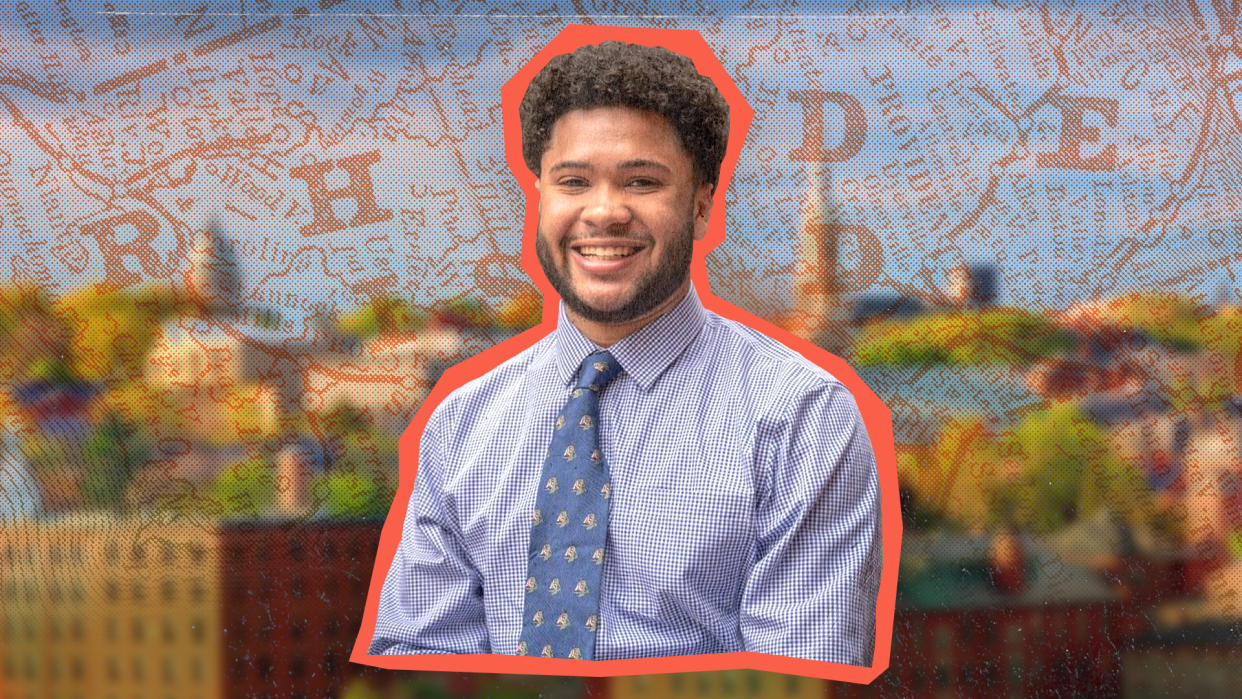This 23-year-old was tired of complaining on social media — so he decided to run for office

In 2022, we’re witnessing the first wave of Gen Z candidates running for Congress. But we’re also seeing the first wave of Zoomers running for state and local offices to effect change in their own backyards. Chegg Life sat down with a series of candidates under 30 who will be on the ballot this November. We asked them about the problems they’re running to fix, the importance of local politics and cynicism among young voters. View the whole series here.
Running for office was never part of Harrison Tuttle’s life plan.
As a kid, he was more concerned with the score of the Boston Celtics game than he was with politics. But as he got older, the Rhode Island native began to reflect on hardships he’d experienced in his life — specifically homelessness and struggles with his education — and the systems that failed him and so many other Rhode Island residents.
In 2020, Tuttle — then just 21 — decided to run for local office during the height of the George Floyd protests.
“I was tired of just posting on social media and talking to my friends,” he says. “I wanted to get involved.”
Today, Tuttle says he’s focused on improving the lives of others. He works at an education nonprofit and is the executive director of the Rhode Island chapter of Black Lives Matter. Tuttle is taking his ambitions a step further by running for State Senate in Rhode Island’s District 31.
When did you become interested in politics or government? And when did you decide to run for office?
I had done some research about other Black activists and found out that the best way to change the world and the state is to get involved with people that share that goal. I actually got involved with a Black Lives Matter branch forming in Rhode Island in the political action committee, and we had the idea of taking protests from the streets to the statehouse. Because here in Rhode Island, although we're a Democrat-controlled state, our elected officials are extremely conservative, deeply entrenched in our city. And since we're the smallest state in the country, there's not a lot of movement or even people running against them.
I got involved in political organizing because I specifically wanted to see things like police accountability, making sure that people have the necessary investments and things like education, housing and health care.
And you touched on this a little, but what would you hope to accomplish if you’re elected?
It's really important to me that work in Cranston and District 31 stays progressive. But most importantly, being able to advocate for things like more affordable housing and making sure that we have a single-payer health care system. Also, making sure that our education systems, specifically our public school, are fully funded. That starts with changing the educational formula. And so we've got a lot of work to do. But it starts with making sure that we have everyday people in office that know some of the struggles that everyday people go through.
What would you say to anyone who suggests that you're too young to be a state senator or that you don't have enough experience? Have you had any opponents or critics use your age against you?
My opponent has a fancy law degree. I don’t. But what I do have is an experience of an education system that has failed me, a state that has not provided enough affordable housing, where someone like my mother had to raise me and my two other brothers on a fixed income and not be able to afford groceries.
And so I have the experience of bad policy by the same people that will tell you that you need more experience. That's why I'm running. And I think anyone who says “wait your turn” needs to step away because clearly they're not interested in actually changing things for the better, just using their position of power to scare off other people that actually want to create change.
In order for us to create the change, we have to be the people that actually have the power.
What would you say to members of your generation who feel cynical about this whole thing? How would you inspire them to try to get involved or make a change?
I think every generation feels as if it's going to be their turn. And what ends up happening is you have folks that do something about it, and you have folks that kind of sit on the sidelines.
We can't afford to sit on the sidelines, we've got to break the mold of what it is to be an elected official. You don't need to be born into royalty; you don't need to have a special degree. What you need to do is have a community and come together and get out there and knock on doors. And that's how you change things. And so we can either be cynical about what's going on and talk about it from the sidelines as we've got elected officials who are 80-plus years old, that are making decisions on our climate, or we can actually do something about it and run for ourselves because, at the end of the day, they won't be there and people our age will be.
View the original article at Chegg Life and signup for the Chegg Life Newsletter
Related...

